A groundbreaking discovery beneath the timeless sands of Luxor, Egypt, has revealed a 2,800-year-old sarcophagus that provides a unique glimpse into the life of an ancient Egyptian court advisor. Unearthed near the Temple of Thutmose III, this remarkable find sheds light on the mysterious figure of Amenrenef, a prominent advisor in the Egyptian court. The discovery offers a fascinating insight into ancient Egypt’s rich history and the roles played by individuals in the Pharaoh’s inner circle. Let’s explore more mysteries with archeology. dulichvn.net
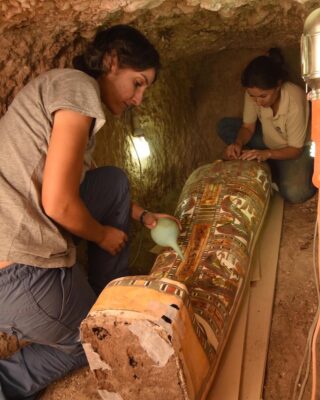
The Discovery of the 2800-Year-Old Sarcophagus
Location of the Discovery
The sarcophagus was uncovered in the Luxor region, near the Temple of Thutmose III, one of Egypt’s most significant and historically rich locations. The proximity to the temple adds historical context, suggesting that Amenrenef may have had close ties to the ruling Pharaoh during his time.
Historical Significance of the Find
This sarcophagus is not just a burial artifact but a testament to the ancient Egyptian culture, offering an invaluable look into the lives of those who served at the highest levels of the court. The find helps archaeologists piece together details of the social structure in ancient Egypt, including the roles of advisors, high-ranking officials, and priests in society.
The Burial of Amenrenef
The sarcophagus is believed to have once contained the remains of Amenrenef, an influential figure in the Egyptian court. His burial, carefully placed in this ornate coffin, speaks to his status and importance, reflecting the elaborate burial practices of the time designed to honor individuals who played crucial roles in Egypt’s political and spiritual life.
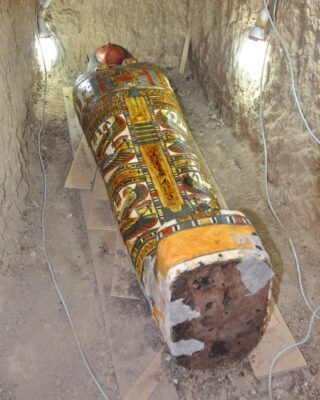
Exploring the Life of Amenrenef
Amenrenef’s Role as a Court Advisor
As a court advisor, Amenrenef likely held a position of great responsibility, offering counsel to the Pharaoh on matters of governance, military strategy, or religious affairs. His role would have been pivotal in shaping Egypt’s policies and maintaining the stability of the kingdom during a significant period in its history.
Artifacts Found in the Sarcophagus
The sarcophagus is ornately decorated, offering clues into Amenrenef’s life and status. The intricate carvings and inscriptions found on the coffin suggest that he was a figure of both political and spiritual importance, with connections to Egypt’s religious and cultural practices that were central to daily life.
Insights Into Ancient Egyptian Society
Amenrenef’s burial and the sarcophagus’s design provide valuable insights into the societal hierarchy of ancient Egypt. The elaborate nature of his tomb is indicative of the esteem in which he was held. Artifacts like these allow modern archaeologists to better understand the lives of high-ranking Egyptians and the complex network of advisors, priests, and officials who helped govern the civilization.
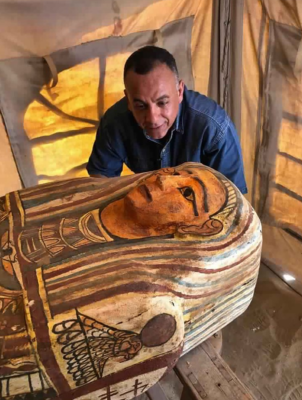
The Sarcophagus and Its Ornate Decoration
Exquisite Craftsmanship
The sarcophagus is a masterpiece of ancient Egyptian craftsmanship. The decorative elements on the coffin offer detailed representations of Egyptian art, symbolizing not only the spiritual journey of the deceased but also his elevated position in society. The intricate hieroglyphs and imagery on the sarcophagus offer a visual testament to the grandeur of ancient Egyptian artistry.
Religious Symbolism
The decoration on Amenrenef’s sarcophagus is rich in religious symbolism. Images of gods, spirits, and protection spells were meant to ensure the safe passage of the deceased into the afterlife. This reflects the deeply spiritual nature of ancient Egyptian culture and their belief in the importance of the afterlife.
A Glimpse Into Ancient Egyptian Burial Practices
The elaborate design of the sarcophagus provides a snapshot of the ancient Egyptian burial practices, which were meant to ensure the deceased’s protection and rebirth in the afterlife. The coffin itself, along with the accompanying burial items, would have been designed to facilitate Amenrenef’s spiritual journey, showcasing the deep cultural significance of death and the afterlife in ancient Egypt.

The Legacy of Amenrenef and Ancient Egyptian Advisors
The Role of Court Advisors in Ancient Egypt
Court advisors like Amenrenef played crucial roles in shaping the decisions of the Pharaoh and, by extension, the fate of Egypt itself. They provided counsel on a variety of topics, from politics to religion, helping to guide Egypt through periods of prosperity and crisis alike. Understanding their lives and roles helps us appreciate the complexity of ancient Egyptian governance.
Amenrenef’s Influence on Egypt’s Legacy
Although Amenrenef’s exact contributions to Egyptian history are not fully known, his position as an advisor suggests that he would have had a lasting influence on the Pharaoh’s decisions. Such figures were essential in ensuring the continuity and stability of the Egyptian empire during the New Kingdom period.
Impact on Archaeological Research
The discovery of Amenrenef’s sarcophagus represents a significant milestone in archaeological research, offering both physical evidence and cultural insight into a key part of Egypt’s past. It serves as a window into the high society of ancient Egypt and provides context for the roles of advisors and other elite figures in the ancient world.
See more: The Triumphant Stele of Amenhotep III: A Window into Ancient Egyptian Power
Conclusion: A Glimpse Into the Past
The 2,800-year-old sarcophagus found in Luxor offers a fascinating look into the life of Amenrenef, an ancient Egyptian court advisor. His ornate burial, combined with the discovery of his decorated coffin, provides a rare opportunity to understand the role of high-ranking officials in ancient Egyptian society. This discovery not only enriches our knowledge of ancient Egyptian culture but also brings us closer to understanding the complex social and political structures that defined one of the world’s most remarkable civilizations
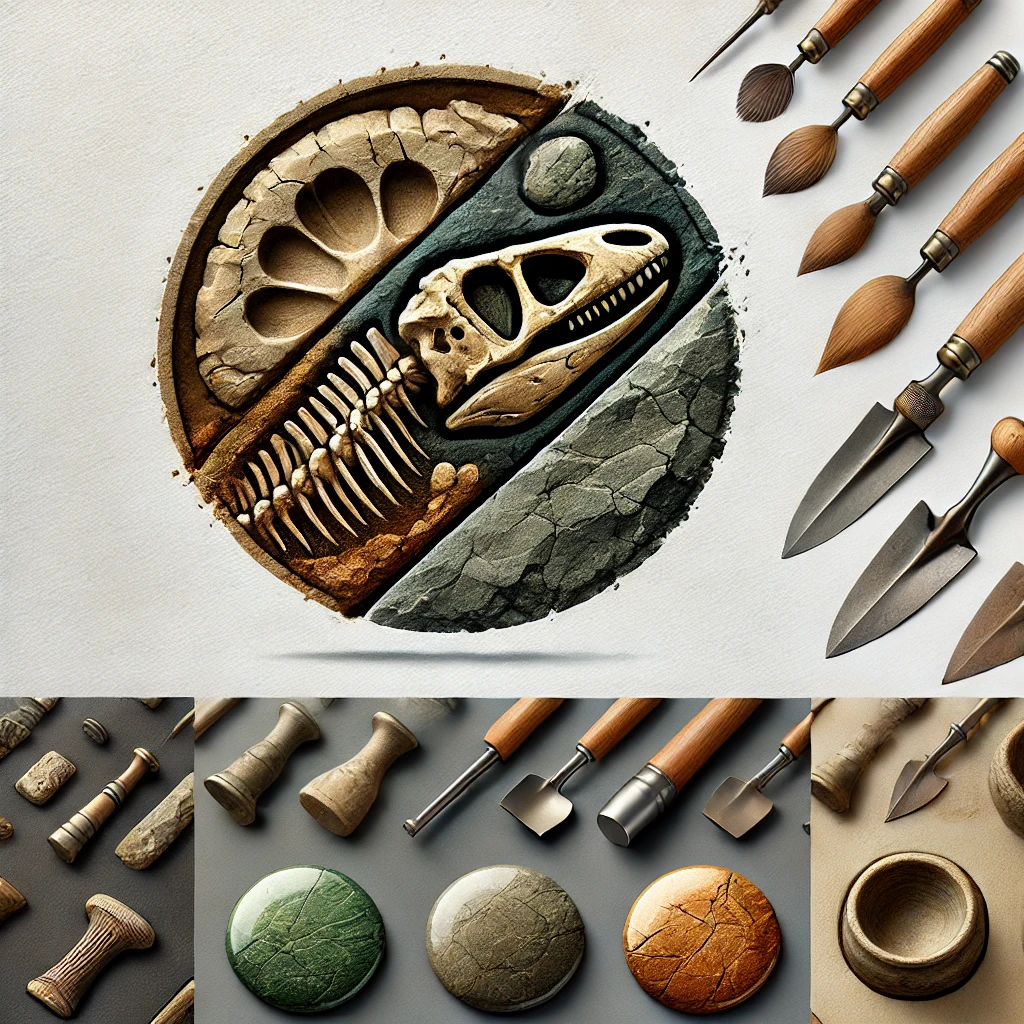
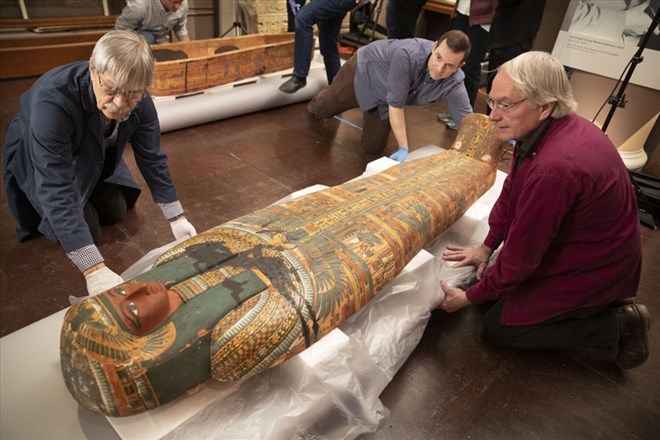
CÁC TIN KHÁC
Mark Twain & Olivia Langdon: A 36-Year Love Story Filled with Laughter and Devotion
The Tollund Man: A 2,400-Year-Old Mystery Preserved in a Danish Bog
Skara Brae: Scotland’s Hidden Neolithic Village
Porta Nigra: The Hidden Depths of Trier’s Iconic Roman Gate